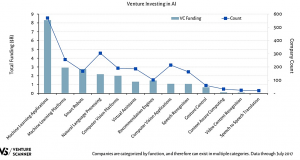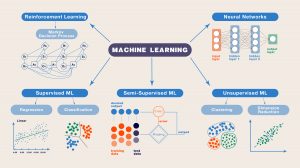 The birth of the field of AI in the 1950s predetermined a new milestone in scientific thought: Since then, it became possible to use computer programs for solving mathematical, economic and other problems, which were relying before on human intelligence. The further development of programs and their growing complexity required more work on code, rules and decision-trees. At that point, realizing the need for more advanced data processing approach, researchers came to what is known today as “Machine Learning” — the ability of computer systems to learn without being explicitly programmed.
The birth of the field of AI in the 1950s predetermined a new milestone in scientific thought: Since then, it became possible to use computer programs for solving mathematical, economic and other problems, which were relying before on human intelligence. The further development of programs and their growing complexity required more work on code, rules and decision-trees. At that point, realizing the need for more advanced data processing approach, researchers came to what is known today as “Machine Learning” — the ability of computer systems to learn without being explicitly programmed.
Today Machine Learning is an integral part of search engines, navigations systems, email providers and social media networks. But in the recent few years, the mobile app market has seen the biggest growth in the use of Machine Learning for customizing the app experience, boosting sales and providing app security.
 Source: Venture Scanner, July 2017
Source: Venture Scanner, July 2017
A significant part of today’s mobile applications is connected to some extent to Machine Learning for the purpose of better user experience and app functionality. The examples of ML in the app include Google Maps (traffic predictions, ‘find parking’ feature ), Netflix (classification of the content by genre, actors, reviews, length, year and so on, personalized recommendations), Flo (period predictions and tracking), Uber (estimated time of arrival, cost of the ride, real-time information on maps), MSQRD (in-app face detection), Tinder (‘smart photos’ feature, personalized recommendations), and many others.
Read More: How Machine Learning Can Help Increase Your Customer Base
Machine Learning for App Marketers
According to a global survey of more than 3,000 executives and interviews with more than 30 technology experts, almost 85% of them believe AI (and ML, in particular) will allow their companies to obtain or sustain a competitive advantage in the market. They see Machine Learning as a tool to disrupt traditional business models and automate some routine daily tasks. But since the application area of Machine Learning constantly grows, the app industry professionals now have even more ways to employ ML for different business objectives:
- Facilitation of data analysis
Machine Learning platforms can assess data from the most profitable users, make a search for similar profiles in complementary apps to gather additional insights such as engagement preferences, behavior, what videos they’re watching online and who may be in the market for relevant offers.
- Trend forecasting and real-time insights
Machine Learning also improves how companies engage customers to cultivate more productive and personalized experiences. The same insights are also analyzed and converted into marketing campaigns that help marketers reach the right user, with the right message at the right time on the right device.
- Programmatic advertising
The employment of Machine Learning algorithms for programmatic advertising allows to further automate the planning, buying, and optimizing of advertising, while learning how campaigns are performing for different audiences, based on different variables such as device and location. It then uses this information to only bid on inventory that aligns with factors that are likely to generate the most success.
- Fraud detection
At the moment, the biggest part of app developers is relying on themselves, their UA department or rule-based solutions, when it comes to fraud identification. The manual search for fraud, performed by UA departments, turns to be extremely time- and energy-consuming process, results of which are strongly correlated with an expertise of UA manager. Rules-based solutions are good in uncovering known fraud patterns, but since app install fraud changes rapidly, rules are losing its efficiency. So Machine Learning found its place in fraud detection as well and now more and more app developers are switching to the new technology, which provides more accurate and complete results.
Deep Learning and Neural Networks
At the moment, app market companies take advantage of four different ML models:
- Supervised learning (predictive model, “labeled” data)
- Unsupervised learning (descriptive model, “unlabeled” data)
- Semi-supervised learning (a mixture of “labeled” and “unlabeled” data)
- Reinforcement learning (Markov Decision Process).
 However, going deeper into the topic, we can also discover a new area of Machine Learning research called Deep Learning. It’s regarded as a more complex way of analyzing significant amounts of data to solve a large number of problems such as computer vision, natural language processing and pattern recognition. Deep Learning is progressing incredibly fast:
However, going deeper into the topic, we can also discover a new area of Machine Learning research called Deep Learning. It’s regarded as a more complex way of analyzing significant amounts of data to solve a large number of problems such as computer vision, natural language processing and pattern recognition. Deep Learning is progressing incredibly fast:
Just two years ago, thanks to Deep Learning, the AlphaGo program, made by Google DeepMind has managed to defeat the world’s No. 2 player in the ancient Asian board game of Go for the first time in history. Now Deep Learning algorithms, using more advanced computational resources (CPU and GPU), allow the use of more complex and deeper models, which is more similar to how a human would draw conclusions, but in the same time, being able to compute millions of options per second. To achieve this, Deep Learning uses a layered structure of algorithms called an Artificial Neural Network. The design of an artificial neural network is inspired by the biological neural network of the human brain.
Read More: RTB House Unveils Deep Learning-Based Technology for Predicting CTR Performance
Implementation of Neural Networks on the Mobile App Market
As of now, Neural Networks are still a developing technology among app industry professionals and not many companies have leveraged it for its own benefit. However, we can see fresh examples of using ANN for advertising (the real-time bidding optimization by Alibaba group), customer experience (DialogFlow platform from Google that builds chatbots for companies and services) and fraud detection purposes (Scalarr’s antifraud solution).
Neural Networks have already shown their capabilities in numerous marketing studies, such as ‘Using Deep Learning Neural Networks To Find Best Performing Audience Segments’, ‘Modelling Consumer Responses to Advertising Slogans’, ‘An improved advertising CTR prediction approach’ and many others.
Neural Networks are also greatly fit the problem of fraud detection. By processing billions of data points and many of the connections between them simultaneously, ANN is able to disclosure the variety of unknown patterns, which, in most cases, are hidden from the human eye and manual analysis. Even in the case of reverse engineering activities applied to specific well-known patterns, a neural network is able to relearn and show good results in detection of already modified fraud types. The ability to collect experience for previous time, simultaneously adding new learning periods, increases effectiveness and accuracy of fraud identification. Similar to human skills, that get better by constant practice. A good example of leveraging ANN for the app install fraud detection is Scalarr’s personalized neural networks, that take into account all app particular qualities and weak spots. Such approach significantly increases the quality of ML model, since app install fraud is characterized by its volatility: change of fraud patterns, the emergence of new types, subtypes and modifications of fraud.
AI global spending is expected to reach $46 billion by 2020, so with more money flowing down into the technology, all current Machine Learning models and Neural Network technologies will be vastly improved upon in the future. However, even today these technologies can be a matter of great help to the whole app industry.
Read More: Visualizing Machine Learning: How Do We Humanize The Intelligence?












Comments are closed.